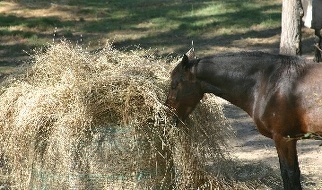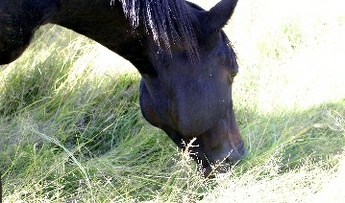What is ESSENTIAL feed for a horse?
Feb 09, 2021
FIBRE - and lots of it - is essential feed for a horse! Horses have evolved to eat a VERY HIGH FIBRE DIET, so this should be the MAIN component of any feeding regime. If a horse needs any extra nutrients or higher energy feeds, these can be added as SUPPLEMENTARY feed (supplementary feed usually means something you would feed in a bucket). You only need supplemental feed if the hay or grass the horse is being provided is deficient in specific nutrients, or the horse is working hard/still growing/lactating (feeding a foal) etc. Other than that, most horses are fine on grass or hay or a combination of the two with perhaps some vitamin/mineral supplementation.
Horses are the ultimate slow feeders
Horses require feed that takes a long time to collect and chew - they are the ULTIMATE slow feeders. They evolved to eat low-energy (low calorie), very fibrous food for many hours of the day and night (around 12-15 hours out of every 24). They did not evolve to eat high-energy ‘meals’ as humans do. If you do not consider this fact, you risk behavioural problems (such as 'cribbing') and gastrointestinal problems such as colic/gastric ulcers and laminitis (laminitis starts in the gut and results in a SERIOUS problem of the hooves).
Horses are herbivores
This means that they eat plants. Plant matter is far bulkier than the feed of a carnivore (a meat-eater). Meat is much more energy dense. This is why a dog, for example, spends a minimal amount of time eating and a lot of time sleeping. Compare this to a horse that spends extensive periods of each day eating (or should do) and much less time sleeping (a horse spends an average of just 4 hours a day sleeping).
A horse is a 'fibre processing animal'
Think of a horse as a ‘fibre processing machine’! Remember that horses have evolved to eat and process large volumes of low-energy (low calorie) grasses and other plants. So try to mimic the natural feeding needs of a horse as much as possible.

Feeding lots of hay is the best way to maintain high-fibre feeding for a horse.
How much should you feed a horse?
Put simply, it is much better for a horse to eat LOTS of low-energy food than a LITTLE high-energy food. Sometimes it can take a while to persuade your horse that this is best for them.
Remember that what your horse likes best is not necessarily what is best for them! Just like a child will often choose sweets and chocolate over salad and vegetables, some horses (especially those that have been fed the wrong types of food in the past) will choose high sugar (high energy) feed if given a chance.
If you overfeed your horse (with too much energy), your horse will get fat. So unless your horse is working hard (i.e. endurance, eventing, etc.), they should need little, if any, supplementary feed.
Should you feed your fat horse less?
But this does not necessarily mean you should reduce the amount of feed you give your horse. Many owners reduce the quantity of feed when it would be better to reduce the quality (in terms of energy) fed to the horse but keep up the volume. Reducing the quantity of feed fed to a horse can be dangerous because horses are meant to graze and browse for at least 12 hours a day (up to about 15). They are 'trickle feeders', meaning they should have food passing through their digestive system almost continuously.
So if your horse is overweight, try to feed 'ad lib' (which means as much as they want/need) of low energy fibre (so hay that is low sugar, for example) and feed NO concentrates (corn, grain, muesli type meals for instance). If the horse needs additives such as vitamins/minerals, then these can be fed in a bucket with chaff.
Another reason that feeding lots of low-energy feed is essential. Horses make lots of saliva when they chew. This saliva buffers the acid in the gut. In a horse, acid is 'dripped' into the stomach constantly because their gut is designed to work continually. So if a horse is fed on high-energy 'meals' and does not have lots of fibre to eat, the acid builds up in the stomach and can cause painful ulcers.
How important is grazing for horses
If you can, allow your horse to graze and aim for this to be the bulk of your horse's diet. Well-managed pasture with a diversity of plant species is the best feed for horses and will save you money because you do not have to buy as much (or any) supplementary concentrate feed or hay. If your grass is high in energy (pasture varies enormously in energy content) and your horse tends to get fat, you will need to be careful that they do not get overweight.
This is a tricky subject because horses vary a lot and pasture varies a lot - sign up for our free mini-course Horses, Pasture and Grazing to get you started on learning (it consists of several short videos that take a total of just one hour to watch) www.equiculture.net/equiculture-free-mini-course

If you can, allow your horse to graze and aim for this to be the bulk of your horse's diet.
When should you feed hay to your horse?
If the pasture runs out, then aim to feed lots of hay. If your hay is too high in energy, you can soak it in water (in a haynet for about an hour) before feeding, which will leach out some sugar. Do not give the water used to soak the hay to your horse, as this will now be high in sugar!
If you start feeding your horse concentrates (because they are not maintaining condition on hay/grass alone), get some expert advice about what to provide. Aim to keep it as simple as possible – it is not usually a good idea to start feeding various feed types as you can end up feeding the horse a very unbalanced diet.
An independent equine nutritionist is an excellent place to start, and reputable feed companies usually offer a free advice service (but keep in mind that they will usually only recommend their products).
This is just a taster about feeding horses. The subject of feeding can become quite complicated, but it does not need to be. You are on the right track if you keep bringing it back to the fact that a horse needs a very high fibre diet with usually just a little or no supplementation.
Make sure you read this blog article to find out more about the benefits of longer grass plants www.equiculture.net/blog/horses-short-grass-or-long-grass
If you enjoyed this article, check out the others on the blog. Also, make sure you sign up for the free mini-course called Horses, Pasture and Grazing and the free 23-page PDF called 10 common POSITION and BALANCE checks for riders

















